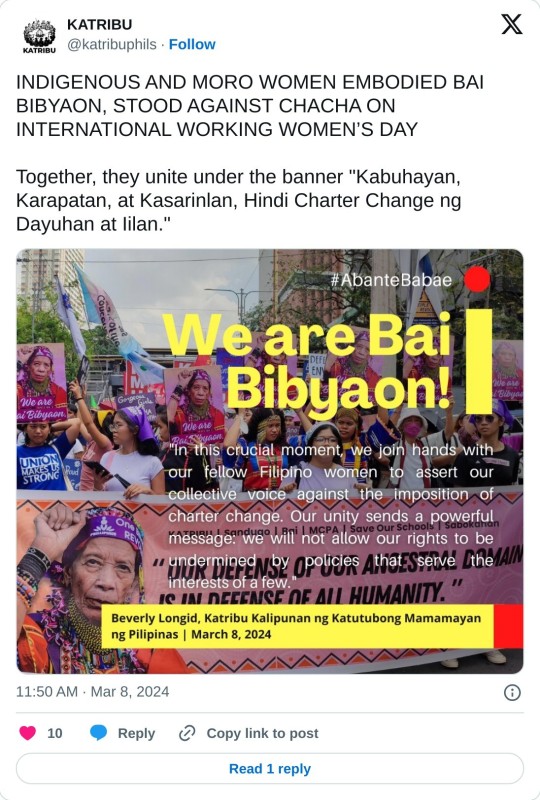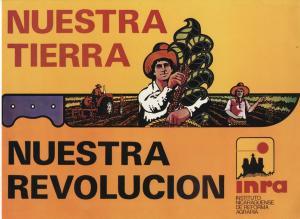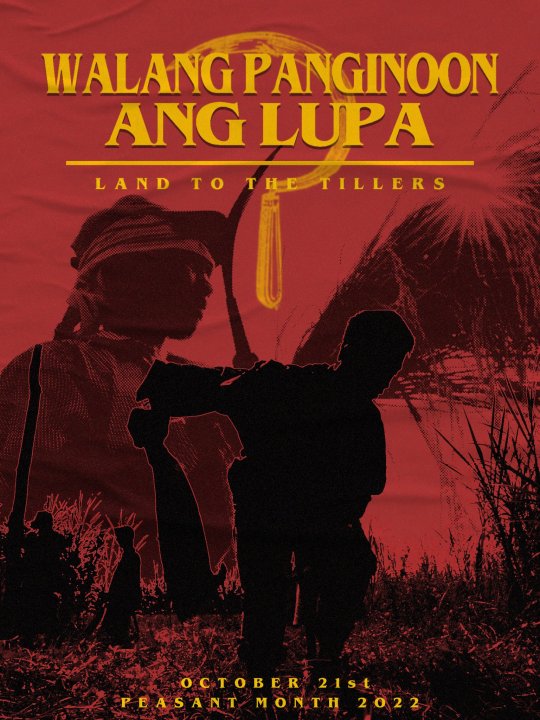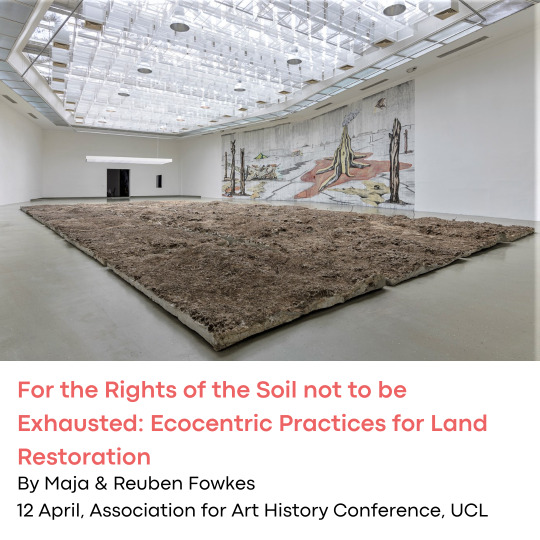#land reform
Text

AlterMidya on Twitter @altermidya:
PANOORIN: Nagsama-sama ang iba't ibang organisasyon para sa #IWWD2024. Tampok na usapin ang paglaban sa niraratsadang Charter change ng Marcos Jr administration.
2024 Mar. 8

Philippine Collegian, official student publication of UP Diliman, on Twitter @phkule:
NOW: Multisectoral groups march from Vicente Cruz Street to Mendiola to register their calls for wage increase, genuine agrarian reform, and national sovereignty this International Women’s Day.
#IWWD2024 #AbanteBabae
2024 Mar. 8

Katribu on Twitter @katribuphils:
INDIGENOUS AND MORO WOMEN EMBODIED BAI BIBYAON, STOOD AGAINST CHACHA ON INTERNATIONAL WORKING WOMEN’S DAY
Together, they unite under the banner "Kabuhayan, Karapatan, at Kasarinlan, Hindi Charter Change ng Dayuhan at Iilan."
Read the full release here: (FB link)
2024 Mar. 8
#abante babae#international working women's day#international women's day#philippines#land reform#labor rights#no to charter change#environmental issues#indigenous rights
5 notes
·
View notes
Text
Our Land! Our Revolution!

Nicaraguan Institute For Agrarian Reform
Sandinistas
#sandanistas#our land our revolution#socialism#socialist politics#communism#marxism leninism#socialist#communist#marxism#marxist leninist#socialist revolution#socialist land reform#land reform#progressive politics
53 notes
·
View notes
Text

land to the tillers !!
october is peasant's month in the philippines, a time to commemorate the struggles of landless peasant farmers and the continuing fight for genuine land reform in the philippines. it's not october anymore but i figured i'd post this anyway
#farmers#peasants#land reform#activism#philippines#filipino#art#artph#artphilippines#land to the tillers#politics
13 notes
·
View notes
Text
Ah, found an inaccuracy in Everitt’s Cicero. Everitt repeats what we might call the “shrinking farmer class” hypothesis - that is, the idea that large plantations were buying up small ones, displacing large numbers of farmers who added to the ranks of the urban poor in Rome.
This argument was central to the Gracchi brothers’ reform proposals, and land redistribution would become one of the most hot-button issues for the next 100 years. It also got the Gracchi killed, setting the stage for political violence.

However, although the Gracchi may have seriously believed this, archaeological evidence since this book was published (2001) shows no evidence of farm consolidation during the late republic in Italy. It appears that the Gracchi based their argument on shrinking army enrollment figures, since only property owners could enroll. It now appears that a more likely reason for the drop in recruitment was that people didn’t want to serve in Spain, a chronically rebellious region that offered little reward and a high risk of death.
It’s not clear whether the Gracchi lied about the issue or merely misunderstood it. The Romans had no concept of macroeconomics as we do today.
Still, I’ll give this book the benefit of the doubt; the shrinking farmer class hypothesis was standard at the time the book was published.
#it's remarkable how even for events 2100 years old getting the most up to date research still matters#i've started appending the publication date to all my epubs#anthony everitt#tiberius gracchus#gaius gracchus#land reform#jlrrt reads#ancient rome#jlrrt speaks#v#jlrrt essays
6 notes
·
View notes
Text
Swimmers poised for biggest mass trespass so far at Kinder reservoir
“Up to 1,000 swimmers are expected to head to Kinder reservoir in Derbyshire on Sunday in the biggest trespass of the water to date. The turnout will mark the anniversary of a mass trespass that helped establish the principle of the right to roam in the UK.
“The swim trespass of Kinder reservoir, situated below Kinder Scout where the 1932 protest took place, has become an annual event and is growing rapidly with the boom in wild swimming. The event is now in its third year, and swimmers of all backgrounds are invited to the reservoir, owned by the water company United Utilities, to exercise ‘the uncontested right to swim in open water’.
“The mass trespass of Kinder Scout on 24 April 1932 involved an estimated 400 people and led to six arrests. It is widely considered to have laid the foundations for the UK’s first national park, the Peak District, and helped pave the way for the establishment of the Pennine Way and other long-distance footpaths.
“Last year about 400 people took to Kinder reservoir to mark the anniversary, and greater awareness, along with the continued growth in wild swimming, means numbers are expected to be substantially higher this year.”
#kinder reservoir#mass trespass#trespass#right to roam#direct action#mass resistance#resistance#private land#land reform#land ownership#land#british politics#uk#politics
3 notes
·
View notes
Text
2015: The Puzzle of Rural Land Rights in PRC
Land and land rights in China have always been a mind-bending topic for me. I can’t claim to be Red or Expert (又红又专), but here below are some of my mind-droppings as I try to understand this a bit better.
Chinese peasants got ownership of the land they worked after 1949 partly thanks to the Communist Party’s rural work teams that killed and encouraged peasants to participate in the killing of…
View On WordPress
0 notes
Text
"...
In the late 1940s and early 1950s, the Communist Party of China carried out land reform throughout the countryside. This was a series of violent campaigns that shook village societies to their core and resulted in the deaths of hundreds of thousands, if not millions of Chinese citizens.
These years only make sense in the context of decades of conflict between the Communists and their Nationalist rivals, but land reform also has deeper roots in an age-old question: Who owns the land? ...
"... Writing the history of the Communists and their revolution is greatly complicated by the party’s attempt to control the historical record. That has been especially true since the Tiananmen Massacre of 1989, when the party began accusing its critics of “historical nihilism” — a charge leveled at those who dared to question official party history.
As far as party historians are concerned, land reform was the transformative moment of Maoist revolution, when the party heroically led long-oppressed peasants to stand up and overthrow feudal power. The party has actively pushed back against any questioning of this interpretation. When the Cyberspace Administration of China released a list of the top ten “rumors” of historical nihilism, number eight on the list was the rumor that land reform had been a mistake. ... "
1 note
·
View note
Text
For the Rights of the Soil not to be Exhausted: Ecocentric Practices for Land Restoration

Co-Directors of the Postsocialist Art Centre (PACT) Maja and Reuben Fowkes will be presenting ‘For the Rights of the Soil not to be Exhausted: Ecocentric Practices for Land Restoration’ on April 12th as part of the ‘Matter Matters: The Aesthetics and Politics of Soil’ panel at the 49th Annual Association for Art History Conference, taking place at University College London.
About the Presentation:
As climate breakdown tests the ecological limits of heavy agriculture, how have artists exposed the entwined colonial and environmental histories of land and proposed ecocentric practices based on more-than-human comradeship and care? These questions are addressed through Anetta Mona Chişa’s One Are (2021), which translated the Roman unit of territory into a 100m2 inverted cast of a ploughed field to reveal the materiality of the soil in its earthy imprint of tilling, cracking and erosion. Also considered is Cooking Sections’ For the Rights of the Soil not to be Exhausted (2019), which engaged with the histories of chernozem from the Ukrainian steppe, from the terror of Soviet grain requisitioning to the impact of shifting climatic zones. The artist duo also collaborated with lawyers to legally enshrine the defence of the soil against capitalist extractivism, encapsulating the planetary tipping point in attitudes towards what anthropologist Kristina Lyons calls the “complex self-organising system” underground.
Image: Anetta Mona Chişa, One Are (2021)
#socialistanthropocene#arthistory#envhum#annualconference#forarthistory2023#research#art history#UCL#land reform#ecocentrism#ecostructure#soil#enviornment
0 notes
Text
Journal #3: How were the Aquinos able to keep their large tract of land of more than 7 hectares?
After People Power 1, where the people of the Philippines started a new era of freedom of democracy, Corazon Aquino became the next president after the Filipino people overthrew the Marcos family from power.
In the history of Agrarian Reform, the late President Ramon Magsaysay convinced the elite-controlled congress to pass several legislations to improve the land reform situation. Since landlords are part of the Senate, he cannot persuade them; his initiatives failed since out of the 300 targeted haciendas for distribution, only 41 were distributed after seven years of implementation.
Aquinos are also landowners in the Philippines and a part of the congress who are responsible for enabling laws to make sure the spirit of the constitution is upheld in the country and, at times, amend or change the constitution itself. The President of the Philippines has the authority to exercise the power of eminent domain that can seize or authorize the seizure of private property for public use with just compensation. That is how the Aquinos were able to keep their large tract of land of more than 7 hectares.
References
n.d. Official Gazette. Accessed October 15, 2022. https://www.officialgazette.gov.ph/about/gov/the-legislative-branch/#:~:text=Congress%20is%20responsible%20for%20making,main%20documents%3A%20bills%20and%20resolutions.
n.d. Official Gazette. Accessed October 15, 2022. https://www.officialgazette.gov.ph/about/gov/exec/.
2016. Slide Share. September 2. Accessed October 15, 2022. https://www.slideshare.net/FayeMadrigal1/history-of-agrarian-reform?fbclid=IwAR2_ZFBVlehwj3_tbm8kd5iDuFOGTL0raD5mP_vCzrBXo38kHSgO4W818fs.
1 note
·
View note
Text




When life gives you lemons
(Inspired by a tweet I couldn’t find again bc twitter is being its quirky self today)
#vashwood#mashwood#creature vash#vash the stampede#and his twin#who’s been reformed??#he’s a sensitive plant on an insensitive land#my art#trigun stampede#trigun
1K notes
·
View notes
Text
Umani Productions and Bulatlat have released a 10-min. documentary titled "Buhay lukad" [lukad = process of extracting coconut meat from the shell, sometimes used interchangeably with copra/kopra]. Has Tagalog subs.
Copra farmers in Bicol have endured decades of misery due to feudal conditions.
2024 Jan. 7
Like most agriculture in the Philippines, the production of copra remains small-scale and limited to individual farmers, most of them paying rent to landlords. A dearth of infrastructure and development forces coconut farmers to sell their products to exporters at drop-dead wholesale prices, who in turn profit off an industry making upwards of £750 million (US$ 1 billion) annually.
The grave disparity between the farmer and the exporter can be traced directly to the Philippines’ status as an agricultural nation plagued by old feudalism. Agricultural land is concentrated in the hands of a small crop of dynasties, corporations, and foreign plantations - making it impossible for farmers to rise above their status as “the poorest of the poor.”
2021 Oct. 16
3 notes
·
View notes
Link
• Mossadegh media: newspaper & magazine articles, editorials
#iran#omar khayyam#iranian#persian#tehran#us foreign policy#middle east#honolulu#hawaii#mossadegh#shah of iran#cold war#land#history#editorial#1950's#landowners#peasant#land reform#caspian sea#persian gulf#britain#oil#diplomacy
1 note
·
View note
Text
Housing And Land, The Issues Of Our Time
Housing And Land, The Issues Of Our Time
The issue of land has, since at least 1838, been one of the most pressing topics on the minds of the Jamaican people. I would venture to say that land — the access to it and all that it entails — remains the single most pressing issue in the national psyche. This fact was brought to the fore once again when the residents of Little London in Westmoreland were kicked off of the lands which they had…
View On WordPress
0 notes
Text
the "hamas actually treated their hostages really well" talking point is INSANE to me do you even hear yourselves? i don't care if these people were/are dining at the fucking ritz every night, do y'all know the amount of pain and turmoil these communities have been in for the past two months??? a friend of mine doesn't even know if her son is still ALIVE. a gilded cage is still a fucking cage, and it's still horrifying that these people are being held against their will. period, end of discussion
#also the way self proclaimed PRISON ABOLITIONISTS ARE SAYING THIS?????????? HELLO#“holding people against their will is only bad when they're given bad food” no bestie you're looking for prison reform. here in prison#abolition land we think holding people against their will is bad in and of itself! what is wrong with you!!! oh my god!!!#also if i hear one more person goinf “omg nobody is talking about x” when a quick google search shows YES THEY FUCKING ARE. i'm gknna explod#jumblr#antisemitism tw#leftist antisemitism#prison abolition#anarchist#anti zionist antisemitism#hamas hostages#10/7 attack
94 notes
·
View notes
Text
Me: "Let's go out; I promise I won't get political."
Me, three drinks later, pounding on the table: "The Philippines need real comprehensive land reform, ASAP!"
#we're listening to 'how asia works' in the car on this trip#but seriously it's actually heartbreaking to hear about how well land reform went in China/Japan/both Koreas/Taiwan#and then how it has completely failed in the Philippines and the country is desperately poorer for it
45 notes
·
View notes
Text
Capitalism and colonialism took community away from us and I want it back. I’ve heard about it from my grandparents and in books and articles online. All throughout history and still today in some parts of the world. People looking out for each other. Regularly. Relentlessly. Neighbors watching each others children, having enough food to share and actually sharing it, being invested in each others lives because everyone has different strengths.
Today community has been strategically painted as a weakness and something to be skeptical of because it is a threat to the very foundations of capitalism. And that’s a real fucking shame because in reality, growing up with community and still having that through adulthood would probably make most people generally happier and less perpetually tired and stressed. It is renewable resilient versatile adaptable self-sustaining and kind of the Ultimate Resource.
#I wish I could bake a cake filled with rainbows and smiles and everyone would eat and be happy#fuck capitalism#global community#local community#communities#community#fuck colonialism#fuck western media#settler colonialism#land back#indigenous liberation#indigenous communities#indigenous culture#human rights#renewable resources#sustainability#intersectional social justice#disability advocacy#social reformer#racial justice#wealth redistribution#healthcare reform#economic justic#environmental justice#generational healing#ancestral healing#industrialization#anti imperialism#religious tolerance#coexistence
14 notes
·
View notes